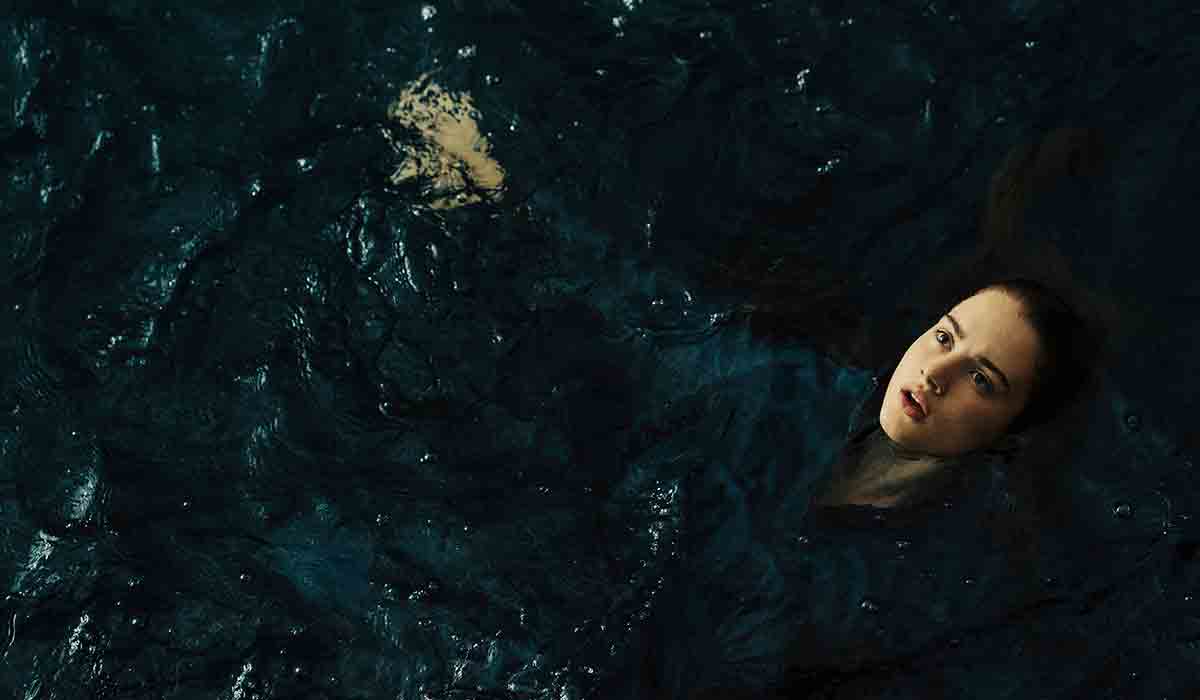Female trauma’s been given a serious workout in cinema, liberally exercised in the fantasy genre of late. The celebrated “Promising Young Woman,” while dark satire, uses hot pink revenge fantasy to acerbically explore unresolved trauma (its we live in a society bias nicely unpacked here), and fellow Sundance film, “The Blazing World,” attempts to fall down the rabbit hole of make-believe and similar flight-or-flight responses to emotional scars, only to grotesquely exploit it with its awkward tumble. Meanwhile, Karen Cinorre’s Sundance directorial debut, “Mayday,” a euphoric, escapist fantasy, meditates on many of the same retreat and reprisal notions, but thankfully, unpacks them with much more lowkey nuance, longing, and dreamy, emotional resonance.
READ MORE: 25 Most Anticipated 2021 Sundance Film Festival Premieres
“I’ve never been in a war,” Ana (Grace Van Patten, known for “Tramps,” and “The Meyerowitz Stories”), says, reluctant to take up arms and sharp-shooting practice in an endless conflict that rages on in Cinorre’s feminist fairy tale. “You’ve been in a war your whole life; you just didn’t know it,” Marsha (Mia Goth) responds sharply, trying to awaken her to a new reality. But is it a dream? A fantasy? Or, has Ana been asleep all her life to the true nature of the world?
READ MORE: 52 Films Directed By Women To Watch In 2021
Also written by Cinorre, and a beguiling and promising debut at that, “Mayday” is clearly influenced by “Wizard of Oz,” “Alice In Wonderland,” and the idea of the fantasy genre as a backdoor escape hatch away from pain. The indie begins, briefly, in our present-day reality, where Ana living in her car, works a menial, thankless job in a catering company kitchen to make ends meet. At the bottom of the food chain, she’s mostly invisible, and figures of male authority are generally inclined to treat people of her stature like shit. On the eve of a wedding, with a huge storm brewing and a reluctant weeping bride adding to the nervous tension in the air, an electrical breaker short circuits and mysteriously transports Ana to a strange new world tied to a roaring sea.
It’s a remote island, and once rescued from the ocean where she nearly drowns, she soon meets a crew of female soldiers who are fighting a forever war—one whose sworn enemy, is men. Damsels are decidedly not in distress here, and Marsha is the ruthless leader and crack shot, using any threatening male soldiers that cross their path as target practice (cold-bloodedly, they also fake distress calls in a twisted game of Battleship where rescue boats loaded with seamen will sink to their deaths in treacherous waters). Other members of this pack who call an abandoned surfaced submarine their home include Bea (Havana Rose Liu), Gert (Stephanie Sokolinski “Soko”), and further removed and on the outskirts of things, the veteran fighter June (Juliette Lewis).
Marsha is definitely the ringleader, though, hoping to recruit Ana to the cause, she soon discovers the newcomer’s a naturally born dead-eyed sniper. “You never had a chance back there,” Marsha persuasively says to Ana about the past life she can’t really remember. “A chance to win,” and this fantasy neverland soon appears to be Ana’s chance at reinvention. “You need to stop hurting yourself and start hurting others,” Marsha says in another of her binary declarations.” But when push comes to shove, Ana soon begins to chafe at all the killing and the militant nature of her merciless leader. Their fractious dynamic eventually challenges the sisterhood of traveling army fatigues and brings the entire reimagining of Ana’s life crumbling down.
READ MORE: ‘Coda’ Dominates 2021 Sundance Film Festival Awards
“Mayday” isn’t all retaliation, riot grrl group empowerment, misandry or evacuation, and absconding from past traumas, however. There’s a luring call and response theme and metaphor humming throughout the movie’s surreal frequency too. With well-crafted, but subtle homages to various fairy tales, the movie is threaded with breadcrumb treats for the perceptive viewer to pick up— the radio warning at the beginning cautioning about the impending storm, the S.O.S. messages heard on the receiver, the clarion call of the sea, and the blood-lusting call to arms Marsha is so fond of. For all its surface ideas of feminist retribution, there’s thankfully a more textured conversation to be found in the film about another life tempting you with its mythological sea-faring whistles, but one that may not be as alluring as it seems on the surface.
And granted, if Cinnore’s metaphors of escape, maritime distress, and siren cries of succor ever get a little too on the nose—and occasionally they do— there are still some excellent aids to smooth-out and soothe any allegorical discomfort. Chief among them, aside from the terrific supporting cast, is cinematographer Sam Levy (“Lady Bird,” “Frances Ha,” also a producer here) and composer Colin Stetson (“Hereditary,” “The Rover”), both of whom help give the movie its softly ethereal and melancholy qualities.
Van Patten sells these notions well too. Ana may have been lost, adrift in life, and the tempest of her existence may have brought her here. Still, any anger she holds is also tempered by curiosity, ambivalence, and melancholy. “I turned you into a hero!” Marsha screams at Ana about her ingratitude at one point in the drama. She seethes at the manipulation, “You turned me into a psychopath!” To Marsha, it’s all the same thing, of course.
These ideas of misplaced rage, reimagining life, and the concepts of being marooned in a place you mistook for freedom early on, all swirl around in this feminist fever dream. While “Mayday” telegraphs where its ultimately going—a dream world bookended by two doses of reality, not unlike the aforementioned ‘Oz’ and ‘Wonderland’— it’s still an enchanting coming-of-age effort, one swimming with decisively hazy, not-stuck-in-a-message ideas of travail, permission, agency, and liberation. [B+]
Follow along with all of our coverage of this year’s Sundance Film Festival here.





